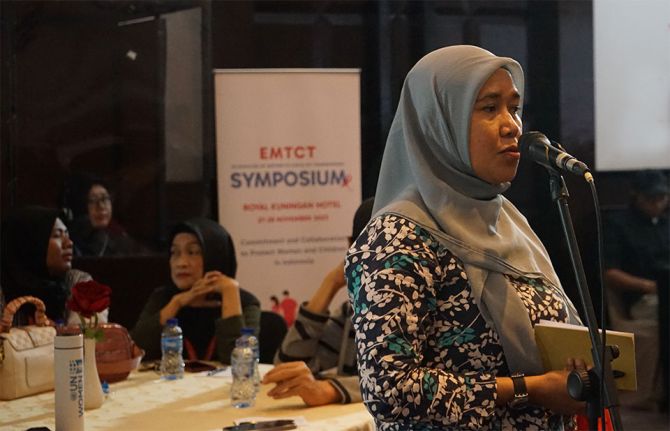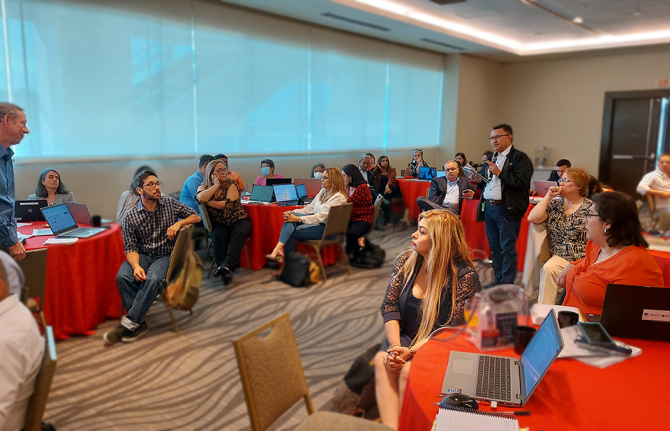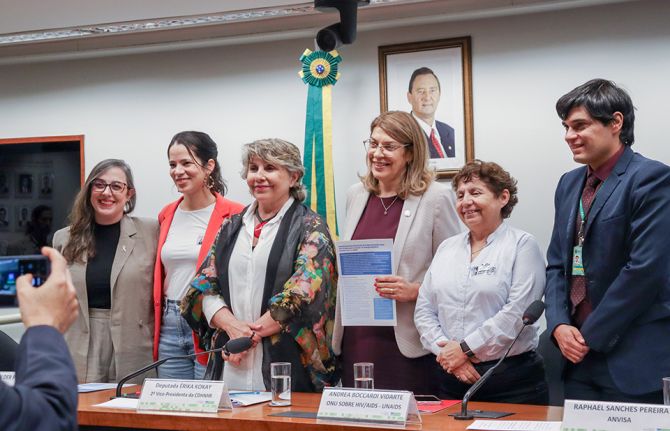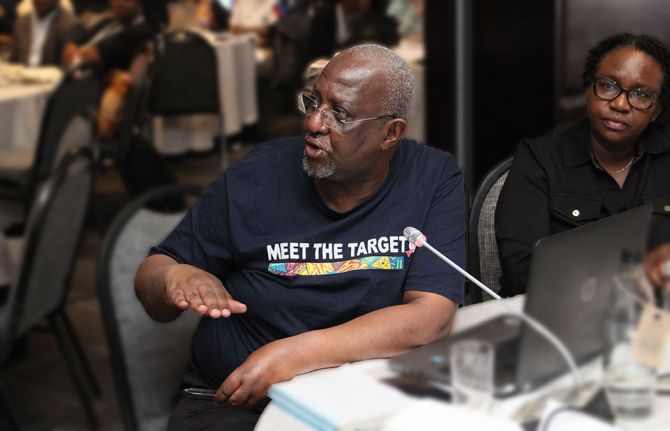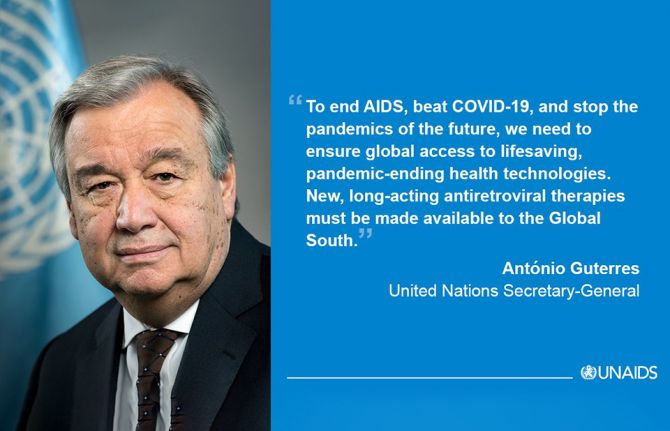
Feature Story
Global Fund: Elimination of HIV transmission from mother to child by 2015 within reach
08 March 2010
08 March 2010 08 March 2010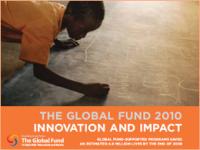
Virtual elimination of mother to child HIV transmission by 2015 is now within reach if current rates of progress by Global Fund-supported programmes and other efforts are maintained. Malaria may be eliminated as a public health problem within a decade in most countries where it is endemic. Tuberculosis prevalence in many countries is declining and the international target of halving TB prevalence could be met by 2015.
These are projections from the Global Fund’s 2010 Results Report, released today. They are contingent on the current rate of scaling up of health investments for the three diseases being at least maintained and ideally accelerated further.
AIDS is not over in any part of the world and without a fully funded Global Fund, our shared dream of universal access to HIV prevention, treatment care and support could become our worst nightmare—putting the lives of millions of people currently on treatment in jeopardy and millions of pregnant women in a position not able to protect their babies from becoming infected.
Mr Michel Sidibé, Executive Director of UNAIDS
“A world where no children are born with HIV is truly possible by 2015,” says Professor Michel Kazatchkine, Executive Director of the Global Fund. “It is also possible now to imagine a world with no more malaria deaths, since already an increasing number of countries have been reporting a reduction in malaria deaths of more than 50 percent over the past couple of years. No other area of development has seen such a direct and rapid correlation between donor investments and live-saving impact as these investments in fighting AIDS, TB and malaria.”
According to the report, Global Fund-supported programmes saved at least 3,600 lives per day in 2009 and an estimated total of 4.9 million since the creation of the Global Fund in 2002. These are people who would otherwise be dead, had it not been for interventions supported by the Global Fund.
“The Global Fund is about getting results. This report clearly shows the world’s investments are making a difference,” said Mr Michel Sidibé, Executive Director of UNAIDS. “However AIDS is not over in any part of the world and without a fully funded Global Fund, our shared dream of universal access to HIV prevention, treatment care and support could become our worst nightmare—putting the lives of millions of people currently on treatment in jeopardy and millions of pregnant women in a position not able to protect their babies from becoming infected.”
The Results Report forms part of the documentation for donors in preparation for the Global Fund’s replenishment conference in October 2010 in New York, where the organization will ask donors for financial contributions for 2011-2013. This is the third time since the Global Fund was established in 2002 that donors are being asked to replenish its finances.
At an initial Replenishment review meeting to be held in The Hague on 24 March, the Global Fund is presenting three resource scenarios for consideration to donors, each with an indication of the results that could be expected in terms of achievements on the ground at the end of the replenishment period. The different scenarios range from US$ 13 to 20 billion for the three-year period.
By the end of 2009, Global Fund-supported programmes provided antiretroviral treatment to 2.5 million people, treatment to 6 million people who had active TB and had distributed 104 million insecticide-treated nets to prevent malaria. In addition to averting at least 3,600 deaths daily, the programmes prevent thousands of new infections and alleviate untold suffering and economic loss for poor families in 144 countries.
Established as a public-private partnership to mobilize and intensify the international response to the three global epidemics and help achieve the UN Millennium Development Goals (MDGs), the Global Fund has disbursed US $10 billion for HIV, TB and malaria efforts through December 2009.
The coming years will see even more results, as half of the total disbursements by the Global Fund were delivered in 2008 and 2009. In addition, much of the US$ 5.4 billion of financing approved in the last two rounds of proposals (8 and 9) will reach countries in 2010 and 2011, and will continue to significantly boost health outcomes.
The progress in combating AIDS, TB and malaria as a result of these investments has also had a positive impact on child mortality and maternal health. The MDGs call for halting and reversing the major diseases as well as reducing child mortality and improving maternal health by 2015.
Global Fund grants have made significant contributions to reducing the largest causes of mortality among women and children. This is particularly the case in sub-Saharan Africa, where HIV, TB and malaria are responsible for 52 percent of deaths among women of childbearing age and malaria alone accounts for 16 to 18 percent of child deaths.
HIV and TB results up to December 2009
- 2.5 million people are currently on antiretroviral therapy (ART), a level of coverage deemed unattainable less than a decade ago.
- AIDS mortality has declined in many high-burden countries.
- The Global Fund contributed about one-fifth of all disbursements by bi- and multilaterals for the HIV response in low- and middle-income countries in 2008.
- 1.8 billion condoms distributed.
- 105 million HIV counseling and testing sessions provided.
- 790,000 HIV-positive pregnant women in low- and middle-income countries received antiretroviral prophylaxis to prevent mother-to-child transmission– which represents 45 percent of coverage of women in need.
- 4.5 million basic care and support services provided to orphans and other children made vulnerable by AIDS.
- Around 6 million people with active TB were treated by December 2009.
- 1.8 million TB/HIV services provided – a 150 percent increase since the end of 2008, contributing to the decline of TB prevalence and mortality rates in many countries.
- The Global Fund provides 63 percent of the external financing for TB and multidrug-resistant TB (MDR-TB) control efforts in low- and middle-income countries – it is by far the major source of international funding for tuberculosis.
- Today, countries are on track to meet the international target of halving TB prevalence by 2015.
HIV
Tuberculosis
Progress towards meeting Millennium Development Goals
The report points out that continued, substantial increases in long-term financial commitments by donors will be needed to consolidate the gains and to reach the MDGs by 2015.
Within that time-frame, 2010 is decisive.
Funds committed now will benefit programmes which will have effect on the ground from 2012 to 2015. The numbers show that countries are approaching a positive tipping point: if they continue on this path, the returns will be exponential and the world will reverse the AIDS, TB and malaria epidemics.
“In health, 2010 is a pivotal year to finance the final stretch of the effort to reach the Millennium Development Goals”, says Professor Kazatchkine. “We have made unprecedented progress but it is fragile. If we lose momentum now there will be a heavy price to pay. A failure to continue the scale-up of investments in health will betray the trust of millions.”
Examples of South Africa’s successes in the fight against HIV and China’s successes in tuberculosis can be found throughout the report.
South Africa has stepped up a rapid expansion of HIV prevention, care and treatment services. The Global Fund disbursed US$ 97.2 million for HIV grants and US$ 87.2 million for TB/HIV grants by the end of 2009 to support the South African efforts to respond to HIV. Activities focused mainly on behavior change communication, provision of ART and TB/HIV collaborative activities. Initially, the Global Fund financed much of the scale-up of ART, but more recently the government has assumed financial responsibility for provision of ART. Between December 2007 and December 2008, the number of people receiving ART in South Africa increased by 53 percent, from 458,951 to 700,500. As ART coverage has increased, mortality rates, which had been rapidly increasing in previous years, stabilized.
The Global Fund has made a substantial contribution to China’s TB control efforts, with a total approved amount of US$ 452.3 million, of which US$ 165.6 million was disbursed by the end of 2009, accounting for about 15 percent of the national TB programme budget. In 2007, China had achieved 100 percent DOTS – the basic package that underpins the Stop TB strategy - coverage and an 80 percent case detection rate for new smear-positive cases. Treatment success reached 93 percent, exceeding the international target of at least 85 percent. The TB burden in China has been steadily declining. Between 2000 and 2008 the TB mortality rate declined from 9.8 to 5.4 per 100,000 population. However, Multi-drug resistant TB is increasing in some parts of China and is becoming a major challenge.
Since its creation in 2002, the Global Fund has become the dominant financier of programmes to fight AIDS, tuberculosis and malaria, with approved funding of US$ 19.2 billion for more than 600 programmes in 144 countries. To date, programmes supported by the Global Fund have saved 4.9 million lives through providing AIDS treatment for 2.5 million people, anti-tuberculosis treatment for 6 million people and the distribution of 104 million insecticide-treated bed nets for the prevention of malaria.
Global Fund: Elimination of HIV transmission from
External links:
Global Fund to Fight AIDS, TB and Malaria
Publications:
Global Fund 2010 Results Report (pdf, 4.18 Mb.)

Feature Story
Global Fund projects that UNAIDS’ call for elimination of mother–to-child HIV transmission by 2015 is within reach
08 March 2010
08 March 2010 08 March 2010
(from left) Professor Michel Kazatchkine, Executive Director of the Global Fund; Hon. Dr. Aaron Motsoaledi, Minister of Health, South Africa; Michel Sidibé, UNAIDS Executive Director and Sisonke Msimang, Executive Director, The Open Society Initiative for Southern Africa. 08 March 2010.
Credit: Juda Ngwenya/The Global Fund
A new report by the Global Fund projects that UNAIDS’ call for the virtual elimination of mother–to-child transmission by 2015 is within reach.
UNAIDS’ Executive Director Michel Sidibé and South Africa’s Health Minister Aaron Motsoaledi, joined the Executive Director of the Global Fund to Fight AIDS, Tuberculosis and Malaria Michel Kazatchkine for the launch of the Global Fund 2010 Results Report in South Africa which highlights progress made towards these three diseases.
The report also projects that if the current rate of scaling up health investments for the three diseases is maintained then malaria may be eliminated as a public health problem within a decade in most countries where it is endemic and the international target of halving TB prevalence could be met by 2015.
Without a fully funded Global Fund, our shared dream of universal access to HIV prevention, treatment care and support could become our worst nightmare—putting the lives of millions of people currently on treatment in jeopardy and millions of pregnant women in a position not able to protect their babies from becoming infected
Michel Sidibé, UNAIDS Executive Director
“With these very exciting goals within reach—we need to do everything we can to ensure they become a reality,” said Mr Sidibé. “Without a fully funded Global Fund, our shared dream of universal access to HIV prevention, treatment care and support could become our worst nightmare—putting the lives of millions of people currently on treatment in jeopardy and millions of pregnant women in a position not able to protect their babies from becoming infected.”
The three leaders were in South Africa, a country that has stepped up a rapid expansion of HIV prevention, treatment, care, and support services. In the last year the new AIDS budget has increased by 33% to US$ 1 billion dollars for 2010. Between December 2007 and December 2008, the number of people receiving ART in South Africa increased by 53 percent, from 458,951 to 700,500. As ART coverage has increased, mortality rates, which had been rapidly increasing in previous years, stabilized.
“With the support of the Global Fund and UNAIDS mother-to-child transmission can be eradicated in South Africa. As the health of our mothers and children directly affects the development of our country. South Africa has to achieve this goal by 2015,” said Dr Aaron Motsoaledi, Minister of Health, South Africa.
Global Fund grants results:
- 2.5 million of the 4 million people are currently on antiretroviral therapy (ART).
- Approved HIV proposals total up to US$ 10.8 billion covering 140 countries.
- 1.8 billion male and female condoms distributed.
- 105 million HIV counseling and testing sessions provided.
- 790,000 HIV-positive pregnant women in low- and middle-income countries received ARV prophylaxis to prevent mother-to-child transmission– which represents 45% of coverage of women in need.
- 4.5 million basic care and support services provided to orphans and other children made vulnerable by AIDS.
The Global Fund will hold its replenishment conference in October 2010. Donors are being asked to replenish its finances from a range of US$ 13 to 20 billion for 2011-2013.
“In health, 2010 is a pivotal year to finance the final stretch of the effort to reach the Millennium Development Goals”, says Dr Kazatchkine. “We have made unprecedented progress but it is fragile. If we lose momentum now there will be a heavy price to pay. A failure to continue the scale-up of investments in health will betray the trust of millions.”
Global Fund projects that UNAIDS’ call for elimin
Multimedia:
Feature stories:
Global Fund: Elimination of HIV transmission from mother to child by 2015 within reach (08 March 2010)
External links:
Global Fund to Fight AIDS, Tuberculosis and Malaria
Publications:
Global Fund 2010 Results Report (pdf, 4 Mb.)
Related

Feature Story
On International Women’s Day, UNAIDS, IAS and 14 partners launch new agenda to improve scientific research for women and children
08 March 2010
08 March 2010 08 March 2010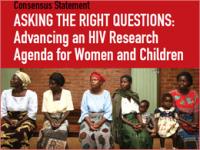
Credit: UNAIDS/A. Gutman
As the world marks International Women’s Day, there is growing concern that women and children are bearing the brunt of the AIDS epidemic. To turn the tide, UNAIDS, the International AIDS Society (IAS) and 14 other leading public and private sector organizations have teamed up to release a new scientific research agenda.
The report called, “Asking the Right Questions: Advancing an HIV Research Agenda for Women and Children” includes 20 specific recommendations to expand and improve responses to the HIV-related challenges facing women and children worldwide.
“With this roadmap, we can work together to remove the roadblocks to universal access to HIV prevention and treatment and move forward to a world where women and children are no longer left behind,” said UNAIDS Executive Director Mr Michel Sidibé.
HIV is the leading cause of death and disease among women of reproductive age. The majority of the estimated 33.4 million people living with HIV in 2008 were women and children.
With this roadmap, we can work together to remove the roadblocks to universal access to HIV prevention and treatment and move forward to a world where women and children are no longer left behind,
UNAIDS Executive Director Mr Michel Sidibé
The Agenda was developed through extensive consultation with investigators, clinicians, civil society and UN agencies and was supported by an expert-led mapping exercise and literature review.
IAS Executive Director Robin Gorna said, “This agenda defines priority research needed to greatly improve our knowledge about and capacity to prevent and treat HIV in women and children. Implementation of this research agenda is key to closing these knowledge and service gaps and to saving women’s and children’s lives.”
The report identifies priority research questions within four broad categories: 1) clinical research on preventing mother-to-child transmission and pediatric treatment, 2) clinical research on women’s treatment issues; 3) operations research for women and 4) operations and implementation research related to stopping mother-to-child transmission.
To address these challenges, the report recommends increased investment in research, greatly expanding data sharing on HIV and women and children, as well as greater efforts to separate clinical data by gender.
The full research agenda on women and children is available online at www.iasociety.org/ilf.aspx.
On International Women’s Day, UNAIDS, IAS and 14
Partners:
Industry Liaison Forum (ILF)
International AIDS Society (IAS)
Publications:
Asking the Right Questions: Advancing an HIV Research Agenda for Women and Children – Consensus statement Marcy 2010 (pdf, 1.42 Mb.)
Making HIV trials work for women and adolescent girls (July 2008) (pdf, 143 Kb.)

Feature Story
Power of words: Brazil LGBT launch guide for media
05 March 2010
05 March 2010 05 March 2010
The Brazilian Lesbian, Gay, Bisexual, Transvestite and Transsexual (LGBT) Association (Associação Brasileira de Gays, Lésbicas, Bissexuais, Travestis e Transexuais or ABGLT) recently launched an “LGBT Communication Manual” aimed at communication professionals, students and teachers to reduce the use of inappropriate language that prejudices, or perpetuates misunderstandings about the millions Brazilian LGBT people and their supporters.
The manual was created with the support of UNAIDS as part of ABGLT’s “Allies” Project. The Brazilian LGBT movement produces a number of tools as part of their goal to educate Brazilians about the human rights of sexual minorities. The tools reinforce the message that every citizen plays an important role in building a fairer, more just society for all regardless of sexual practice.
Unfortunately social norms still make it difficult for people to deal with diversity and respect to all. We do hope that this manual may mean an additional seed of cultural and behaviour change, for the better.
Pedro Chequer, UNAIDS Country Coordinator in Brazil
Highlighting common misconceptions about LGBT practices and identities that continue to be seen in the media is one of the themes of the manual. For example, a man may have sex with men without considering himself homosexual, bisexual or gay. He may have homosexual practices, but continue to identify himself as a heterosexual man.
For this situation, health professionals have coined the phrase “men who have sex with men” or MSM, to identify the sexual behaviour of a person rather than labelling sexual orientation or gender identity.
The manual also reminds professionals that a person should never be identified in media product (including news story, video, or photograph) as being HIV positive unless they formally agree in advance.
Social norms still barrier to diversity
“The initiative of elaborating a manual like this is extremely crucial and we welcome it and congratulate the ABGLT for such community service,” said Mr Pedro Chequer, UNAIDS Country Coordinator in Brazil.
Mr Chequer notes that Brazilian legislation does not punish people for their sexual orientation or gender identity, and on the contrary, it states and reinforces the rights of all citizens.
“In addition,” said Mr Chequer, “the very First National Conference on LGBT people was convened by the President of Brazil in 2008. However, unfortunately social norms still make it difficult for people to deal with diversity and respect to all. We do hope that this manual may mean an additional seed of cultural and behaviour change, for the better”
Lesbian, Gay, Bisexual, Transvestite and Transsexual communities in Brazil
The Brazilian Lesbian, Gay, Bisexual, Transvestite and Transsexual Association was created in 31 January 1995 by 31 founding groups. Currently it is a national network of 220 organizations and is the largest LGBT network in Latin America.
The resolution of the 1st ABGLT Congress in 2005 reads: “Vulnerability to HIV and its consequences are heightened by violations of the right to life, freedom, information, education, health and equality (non-discrimination)... Reducing vulnerability is related to increased active citizenship, whereby in addition to having rights and duties, citizens take an increasing part in public matters.”
Power of words: Brazil LGBT launch guide for medi
Related

Feature Story
Micro-Contribution for Massive Good
04 March 2010
04 March 2010 04 March 2010
An innovative fundraising movement is taking to the skies on Thursday, with the potential to raise millions of dollars for HIV and global health. UNAIDS Executive Director Michel Sidibé joined UN Secretary-General Ban Ki-Moon, former US President Bill Clinton, movie director Spike Lee and international recording artists Will.I.Am and David Guetta in New York to launch MASSIVEGOOD. This new fundraising tool will enable travellers to make a “micro-contribution” towards major global health causes every time they buy a plane ticket, reserve a hotel room or rent a car.
From this week, travellers in the United States can go to commercial travel websites like Travelocity and Accor Hotels and find MASSIVEGOOD. With one click they can contribute US$ 2 to fighting HIV, malaria and tuberculosis and to improving maternal and child health care in developing countries. With the global financial crisis tightening conventional funding, this new fundraising mechanism can help achieve universal access to HIV prevention, treatment, care and support.
Innovative financing mechanisms such as MASSIVEGOOD are critical to keeping the four million on antiretroviral treatment alive.
Michel Sidibé, UNAIDS Executive Director
“Hope for universal access must not turn into a nightmare. Innovative financing mechanisms such as MASSIVEGOOD are critical to keeping the four million on antiretroviral treatment alive,” said Mr Sidibé.
The Millennium Foundation created MASSIVEGOOD with the support of the global travel and tourism industry. Funds will be distributed to UNITAID, an organization which increases the availability of key treatments in poor countries by purchasing life-saving drugs.
At the official launch on 4 March Secretary-General Ban Ki-moon clicked on MASSIVEGOOD and made the very first $2 donation. He was joined by Mr Sidibé, Mr Clinton and other leaders in innovative financing.
Mr Clinton said “With MASSIVEGOOD, the Millennium Foundation has found a way to involve millions in a new way to solve today’s global health crisis. It really is a great honour to be the first to click MASSIVEGOOD and I look forward to watching movement grow.”
Other key figures in global health also praised the initiative. Dr. Margaret Chan, Director-General of the World Health Organization, said “The launch of MASSIVEGOOD is happening at a critical turning point in the international community’s commitment to the Millennium Development Goals. With only five years left to act on the promises of the 2000 Millennium Declaration, we need initiatives that encourage everyday people to get involved in global health causes.”
The launch is part of series of events in New York City promoting innovative fundraising mechanism. Earlier in the week, Grammy Award-winning recording artist Will.I.Am recorded a new song, “MASSIVEGOOD” in collaboration with DJ David Guetta and internationally acclaimed South African singer Yvonne Chaka Chaka.
While celebrities and world leaders are helping MASSIVEGOOD to take off, it will be up to individual travellers to transform their pocket change into a ticket to a better life for millions of people in developing countries.
Micro-Contribution for Massive Good

Feature Story
Fiji first Pacific Island nation with colonial-era sodomy laws to formally to decriminalize homosexuality
04 March 2010
04 March 2010 04 March 2010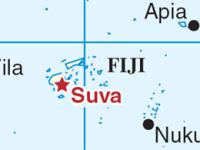
Marking a significant step towards achieving the country’s universal access goals, Fiji passed a law decriminalizing consensual homosexuality through the Fiji National Crimes Decree on 1 February 2010. With this legislation Fiji becomes the first Pacific Island nation with colonial-era sodomy laws to formally decriminalize sex between men*.
The new Crimes Decree removes all clauses about “sodomy” and “unnatural acts” and uses gender neutral language in the remainder of the sexual offences section.
“We’d like to congratulate the Government of Fiji on taking a bold step by removing the punitive law,” said Stuart Watson, the Pacific Coordinator of UNAIDS.
“This reform is an important milestone towards achieving a rights-respecting legal framework, not only for men who have sex with men but the entire community in Fiji.”
HIV, the law and human rights in the Pacific
In 2007 the UNAIDS Secretariat and UNDP reviewed the legislation of 15 Pacific Island countries relevant to HIV issues, including discrimination, ethics, access to treatment and privacy and confidentiality. The Cook Islands, Federated States of Micronesia, Fiji, Kiribati, Marshall Islands, Nauru, Niue, Palau, Papua New Guinea, Samoa, Solomon Islands, Tokelau, Tonga, Tuvalu and Vanuatu were included in this project.
This reform is an important milestone towards achieving a rights-respecting legal framework, not only for men who have sex with men but the entire community.
Stuart Watson, Pacific Coordinator of UNAIDS
Following this review, UNAIDS’ Pacific office along with the UNDP Pacific Center, and the Regional Rights Resource Team (RRRT) convened a meeting in New Zealand with Attorney Generals and Ministers of Health from the countries. Together with leading international and regional experts they discussed HIV, the law and human rights to relation to the specific national laws in the region that impact the response to HIV. The aim was to better support effective and rights-based legal responses to the epidemic.
The participants reaffirmed the importance of implementing “The Pacific Regional Strategy on HIV/AIDS 2007-2008”, endorsed by Pacific Heads of Governments in Samoa in 2004. This regional strategy is an all-encompassing plan that highlights the importance of human rights in any HIV intervention.
Call for review, reform and enactment of appropriate legislation
The Attorney Generals and Ministers of Health then called for the review, reform and enactment of appropriate legislation that reinforces universal human rights to protect and ensure the dignity of all people affected by HIV; that promotes an integrated response to HIV taking into account the interrelation between sexual and reproductive rights and prevention of HIV; and further protects the rights of people in communities regardless of gender, sexuality, sexual or gender identity, or other defining characteristic.
As a result of this initial UN-sponsored consultation, the Republic of the Fiji Islands requested technical assistance from UNAIDS and WHO to help draft comprehensive rights-based HIV legislation for the country. Parallel to the drafting and community consultation process for the national HIV Decree, and based on the High court’s ruling, the colonial era law criminalizing sex between men was removed. This became law on 1 February 2010 through the Fiji National Crimes Decree.
HIV in the Pacific
The 2009 AIDS Epidemic Update notes that there is generally a very low HIV prevalence in the Pacific compared with other regions. In these small island nations adult HIV prevalence tends to be well below 0.1%. National epidemics are overwhelmingly driven by sexual HIV transmission, although the specific populations most affected vary substantially within the region.
According to the Report of the Commission on AIDS in the Pacific the extent to which HIV is transmitted by sex between men in the Pacific is not known. Since most sex between men in the Pacific is hidden, illegal and denied, it is not addressed appropriately in most national HIV plans.
Behavioural surveillance identifies male-to-male sex among youth in Solomon Islands, Vanuatu and Samoa, as well as police and military in Fiji Islands, STI clinic patients in Fiji Islands and Samoa, and seafarers in Kiribati. Despite a possible link between unprotected sex between men and relatively high rates of HIV infection in Papua New Guinea, Fiji, New Caledonia, French Polynesia and Guam, none of these countries has conducted recent behavioural surveillance surveys or qualitative studies about the characteristics of these men, or initiated targeted campaigns to encourage them to use safer sexual practices.
Major obstacles to making such campaigns effective remain, both with the social stigma and the illegal status of homosexual activity. Not only are men ashamed of or embarrassed about disclosing their sexual activity, they are also deterred from finding out what they need to know to reduce their risk or to buy condoms.
Stuart Watson, believes that legal reform will enable better outreach to these communities.
“The change in law is a huge step towards being able to approach all communities with education programmes and prevention resources. This would enable better access to HIV prevention services for all, reducing HIV and sexually transmitted infection risk,” said Mr Watson.
* Male to male relationships are not legal and are punishable by imprisonment in the following 9 Pacific island nations: Cook Islands, Kiribati, Nauru, Palau, Papua New Guinea, Samoa, Solomon Islands, Tonga, Tuvalu.
A further 13 countries and territories in the Pacific do not criminalize men who have sex with men.
Fiji first Pacific Island nation with colonial-er
Publications:
2009 AIDS Epidemic update (pdf, 2.90 Mb.)
Turning the tide: An open strategy for a response to AIDS in the Pacific. Report of the Commission on AIDS in the Pacific (02 Dec 2009) (pdf, 1.52 Mb.)

Feature Story
UNAIDS takes action to empower women and girls to protect themselves from HIV
02 March 2010
02 March 2010 02 March 2010UN to support civil society and governments to address gender inequalities and human rights violations that continue to put women and girls at risk of HIV infection

Credit: UNAIDS
New York/Geneva, 2 March 2010 – UNAIDS, together with celebrated artist and activist for women and HIV, Annie Lennox, has launched an Agenda for Accelerated Country Action for Women, Girls, Gender Equality and HIV (2010–2014), which has been developed to address gender inequalities and human rights violations that continue to put women and girls at risk of HIV infection.
The five-year action plan was launched at a high-level panel during the 54th meeting on the Commission on the Status of Women, being held in New York until 12 March. It calls on the UN system to support governments, civil society and development partners in reinforcing country actions to put women and girls at the centre of the AIDS response, ensuring that their rights are protected.
Violence against women is unacceptable and must not be tolerated.
Michel Sidibé, UNAIDS Executive Director
“Violence against women is unacceptable and must not be tolerated,” said Michel Sidibé, UNAIDS Executive Director. “By robbing them of their dignity, we are losing the opportunity to tap half the potential of mankind to achieve the Millennium Development Goals. Women and girls are not victims, they are the driving force that brings about social transformation.”
UNAIDS and partners will support the country roll-out of the Agenda for Action in pathfinder countries, including Liberia.
Annie Lennox underlined her unshakable commitment to the cause of women and girls affected by HIV.
“I believe we need a broad movement for change,” she said. “The bottom-line for me is that, in essence, we are all the same. All human beings, wherever we are, have the basic right to be happy and healthy. I see this Agenda for Action as a great opportunity to bring the realities faced by many women and girls to the forefront and to call attention to the injustices faced by many women and girls, placing them at a bigger risk of HIV.”
- HIV is the leading cause of death and disease among women of reproductive age (15-49 years) worldwide.
- In Southern Africa, HIV prevalence among young women aged 15–24 years is on average about three times higher than among men of the same age.
- Up to 70 percent of women worldwide encounter violence. Experiencing violence hampers women’s ability to negotiate safe sex.
As of December 2008, 33.4 million people were living with HIV worldwide, of which 15.7 million ─ almost half ─ were women. The proportion of women infected with HIV has risen in many regions over of the world over the past 10 years. In sub-Saharan Africa, 60% of people living with HIV are women. Nearly 30 years into the HIV epidemic, HIV services do not sufficiently address the specific realities and needs of women and girls.
I see this Agenda for Action as a great opportunity to bring the realities faced by many women and girls to the forefront and to call attention to the injustices faced by many women and girls, placing them at a bigger risk of HIV.
Annie Lennox
"The information on sexual and reproductive health for HIV-positive women and girls is still limited,” said Suksma Ratri, a member of Indonesia’s Positive Women’s Network, who participated in today’s launch. “Being sexually active and HIV-positive at the same time is very difficult. Women and girls living with HIV often have restricted options when it comes to their sexuality. They need an adequate and friendly support system that enables them to make free decisions about their sexuality without being discriminated and stigmatised. I think the Agenda for Action will be a good platform for countries to strengthen services for women and girls."
The Agenda for Action provides clear action points on how the UN can work together with governments, civil society and development partners to:
- produce better information on the specific needs of women and girls in the context of HIV;
- turn political commitments into increased resources and actions so HIV programmes can better respond to the needs of women and girls; and
- support leaders to build safer environments in which women’s and girl’s human rights are protected.
The actions include:
- Improving data collection and analysis to better understand how the epidemic affects women and girls.
- Reinforcing the UN Secretary-General’s UNiTE to End Violence against Women campaign through the AIDS response.
- Ensuring that violence against women is integrated into HIV prevention, treatment, care and support programmes.
- Analyzing the impact of socio-cultural and economic factors that prevent women and girls from protecting themselves against HIV.
- Supporting women’s groups and networks of women living with HIV to map commitments made by governments on women and HIV.
- Scaling up engagement of men’s and boys’ organizations to support the rights of women and girls.
The launch of the Agenda for Action involved many prominent leaders from the United Nations system, governments and civil society. Speakers included Asha Rose Migiro, United Nations Deputy Secretary-General; Melanne Verveer, US Ambassador at Large for Women’s Global Issues; Helen Clark, UNDP Administrator; and Vabah Gayflor, Liberia’s Minister of Gender and Development.
UNAIDS takes action to empower women and girls to
Press centre:
UNAIDS takes action to empower women and girls to protect themselves from HIV (2 March 2010)
Multimedia:
Contact:
Richard Leonard
New York
Tel. +1 347 420 1024 | E-mail: leonardr@unaids.org
Jonathan Rich
New York
Tel. +1 347 262 9115
E-mail: jonathan@jcrcommunications.com
Dominique De Santis
Tel. +41 22 791 4767
E-mail: desantisd@unaids.org

Feature Story
54th Commission on the Status of Women opening calls for Action on Gender Equality
02 March 2010
02 March 2010 02 March 2010A version of this story is published at www.unfpa.org

During a high-level panel on the opening day of the 54th Commission on the Status of Women, UNFPA Executive Director Thoraya A. Obaid, speaking on behalf of the United Nations, called attention to the links between the right to sexual and reproductive health and women's empowerment, gender equality and the achievement of the Millennium Development Goals.
Throughout the first two weeks of March, the 54th Commission on the Status of Women will conduct a 15-year review of the Beijing Declaration and Platform for Action. This Platform, which emerged from the Fourth World Conference on Women in 1995, reinforced the importance of women's rights and empowerment as established a year earlier in Cairo. It called for action on 12 key issues: poverty, education and training, health, violence against women (one of UNAIDS nine priority areas), armed conflict, economy, power and decision-making, institutional mechanisms, human rights, media, environment and girls.
We stand a better chance of solving the world’s problems if men and women join together as equal partners in finding innovative solutions.
UNFPA Executive Director Thoraya A. Obaid
The commission will emphasise the sharing of best practices as well as discussion of obstacles and gaps, especially those related to achieving the Millennium Development Goals, whose tenth year review will take place in September. The synergy among the three development platforms has been articulated by UNFPA Executive Director in a statement she has issued to mark International Women’s Day 2010 (8 March).
“In 1994, at the International Conference on Population and Development (ICPD), leaders declared for the first time that reproductive health and rights are fundamental to women’s empowerment, gender equality and sustainable development. And fifteen years ago, at the Fourth World Conference on Women, world leaders agreed on a platform for action for equality, development and peace.
“Today many of these agreements are reflected in the Millennium Development Goals to which world leaders have agreed, to reduce poverty and put our world on a more sustainable path…With ideas spreading faster than ever, here is an idea whose time has come: We stand a better chance of solving the world’s problems if men and women join together as equal partners in finding innovative solutions.”
At the commission, UNFPA is participating in several side events on sexual and reproductive health rights, HIV, violence against women, peace and security, the role of men and boys as partners for gender equality, and female migration. The Fund is also releasing a review of its contributions to the Beijing commitments, Beijing at Fifteen: UNFPA and Partners Charting the Way Forward (2010).
Another initiative to promote the idea of gender equality and empowerment of women during 2010 is a special radio/audio series on gender equality and the empowerment of women with a focus on young woman and adolescent girls. The programmes, being produced by UN Radio with support from UNFPA, will explore the challenges facing young adolescent girls, as well as their dreams for the future. Additional activities throughout the year will call attention to the Beijing Platform and its links to the International Conference on Population and Development and the Millennium Development Goals
54th Commission on the Status of Women opening ca
Cosponsors:
United Nations Population Fund (UNFPA)
Press centre:
Statement by UNAIDS and UNIFEM to the 54th session of the Commission on the Status of Women (pdf, 63 Kb)
Feature stories:
UNDP Head Helen Clark highlights importance of gender equality for Papua New Guinea to achieve MDGs (22 February 2010)
Linking sexual and reproductive health and rights and HIV prevention is key says Dutch AIDS Ambassador Marijke Wijnroks (08 February 2010)
WHO tool to integrate gender into AIDS programmes (15 January 2010)
Publications:
Agenda for accelerated country action for women, girls, gender equality and HIV (pdf, 676 Kb)
Beijing at 15 UNFPA and Partners Charting the Way Forward
UNAIDS Outcome framework 2009-11 (pdf, 396 Kb.)
Fact sheet: Women, girls and HIV (pdf, 31.6 Kb.)

Feature Story
UNAIDS, Annie Lennox, launch action framework for women, girls and HIV
02 March 2010
02 March 2010 02 March 2010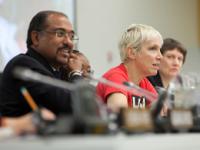
(from left) Michel Sidibé, UNAIDS Executive Director; Annie Lennox, artist and political and social activist; Helen Clark, UNDP Administrator. NY, 2 March 2010
Credit: UNAIDS/B. Hamilton
Globally, women and girls continue to be affected disproportionately by HIV. AIDS related illness is the leading cause of death and disease among women of reproductive age (15-49 years) worldwide. In sub-Saharan Africa as a whole, women account for approximately 60% of estimated HIV infections. The proportion of women to men living with HIV in Asia rose from 19% in 2000 to 35% in 2008.
UNAIDS Executive Director Mr Michel Sidibé and artist and political and social activist Annie Lennox launched the Agenda for Accelerated Country Action to bring global political attention to the well-being of women and girls today at the United Nations in New York. Today the 15-year review of the implementation of the Beijing declaration and Platform for Action opened at the Commission of the Status of Women.

Annie Lennox, artist and political and social activist addresses the launch of the action framework for women, girls and HIV. NY, 2 March 2010
Credit: UNAIDS/B. Hamilton
Ending violence against women is one of the key priority areas of UNAIDS. Up to 70% of women experience violence in their lifetime–in South Africa a woman is raped every minute.
The launch, moderated by Mr Sidibé, took the form of a dialogue, involving approximately 300 representatives from governments, civil society, and networks of women living with HIV, and women’s rights advocates and activists.
“The brutality faced by many women and girls goes far beyond social policy issues; in essence it is about equality and justice – it must become a foreign policy issue. This Agenda for Accelerated Country Action for women and girls is a path to open dialogue with leaders of countries on how we shape the world of tomorrow,” Mr Sidibé said when opening the floor for discussions.
We know that gender inequality puts millions of women and girls across the globe at greater risk of HIV infection.
Annie Lennox
Annie Lennox called for a broad movement for change saying that AIDS responses should address the rights of women and girls and must challenge gender roles to successfully stop the AIDS epidemic.
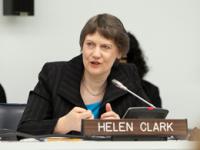
Helen Clark, UNDP Administrator. NY, 2 March 2010
Credit: UNAIDS/B. Hamilton
The Agenda for Accelerated Country Action aims to tie the women’s human rights movement with the global AIDS response and mobilize all constituencies, starting with UNAIDS and the United Nations Development Fund for Women, through increased political commitment, stronger capacity and increased resources.
This Agenda for Accelerated Country Action for women and girls is a path to open dialogue with leaders of countries on how we shape the world of tomorrow.
Michel Sidibé, UNAIDS Executive Director
“We know the facts,” Ms Lennox said, “we know that gender inequality puts millions of women and girls across the globe at greater risk of HIV infection. It is unacceptable that only 38% of young women have accurate, comprehensive knowledge of HIV.”
Mr Sidibé asked Ms Lennox how music and culture can play a role in inspiring positive change in societal practices that currently undermine the health of women and girls and violate their rights.
“I’m using my voice to call on leaders—in political, religious and business spheres—and communities to change the power imbalances between men and women, for a better world,” Ms Lennox replied.

The launch involved approximately 300 representatives from governments, civil society, and networks of women living with HIV, and women’s rights advocates and activists.
Credit: UNAIDS/B. Hamilton
The Agenda for Accelerated Country Action was developed in response to the pressing need to address the persistent gender inequality and human rights violations that affect women and girls specifically. It outlines the need to understand and respond to the particular effects of the HIV epidemic on women and girls and translate political commitments into scaled-up action.
Importantly the Agenda advocates for men to work side by side with women for gender equality, challenging ideals of masculinity that lead to increased risk-taking and sanction violence against women and girls.
The Joint United Nations, which works in countries, will now begin a dialogue with civil society, including networks of women living with HIV and women’s groups, government and development partners to identify opportunities together to step up the response.
UNAIDS, Annie Lennox, launch action framework for
Press centre:
UNAIDS takes action to empower women and girls to protect themselves from HIV (02 March 2010)
Statement by UNAIDS and UNIFEM to the 54th session of the Commission on the Status of Women (11 MArch 2010)
Multimedia:
Watch press conference
Photo gallery
Feature stories:
Violence against women and HIV (10 Nov 2009)
WHO report on the health of women: AIDS leading cause of death globally in women of reproductive age (09 Nov 2009)
Publications:
Agenda for accelerated country action for women, girls, gender equality and HIV (pdf, 676 Kb.)
Community Brief for the Agenda for accelerated country action for women, girls, gender equality and HIV (pdf, 125 Kb.)

Feature Story
Call for submissions Global Health Governance: Special Issue on “Governance and the AIDS Response”
01 March 2010
01 March 2010 01 March 2010
Global health Governance: The Scholarly Journal for the New Health Security Paradigm
The next issue of Global Health Governance will focus on Global Health Governance and the AIDS Response. Michel Sidibé, Executive Director of the United Nations Joint Programme on HIV/AIDS (UNAIDS) and Kent Buse, Senior Policy Advisor to the Executive Director, will serve as guest editors for this issue.
This special issue will explore the contributions of the global AIDS response over the last 30 years to innovations in governance principles, paradigms, and practice. It will outline present challenges, opportunities and future directions for improving both the global governance of the AIDS response and governance approaches to human development, security and dignity more generally. AIDS governance at global, national and community levels has not only transformed the nature of health systems governance, but also shed light on a number of socio-political issues with significant implications for human development. The editors seek a balance of theoretical/conceptual and empirical pieces from a wide variety of disciplinary perspectives including public health, political science and international relations, international law, philosophy, history, anthropology, business and public administration to better understand and improve this exciting area of practice and enquiry.
The focus of manuscripts must be on the governance of the AIDS response and/or lessons it offers for Global Health Governance. The range of possible article topics is vast and may include, but is not limited to, the following:
- Enhancing effectiveness and legitimacy of global governance mechanisms and institutions;
- Systems for inclusive policy-making as well as the engagement of civil society and the private sector in planning, accountability, oversight of national responses;
- Innovations, successes, failures and potential of transparency/accountability mechanisms—including within the multilateral system;
- Process of establishing/validating/disseminating/enforcing novel global norms—particularly concerning sexual and human rights, punitive laws, inclusive policy making, accountability, ethical trials, access; gender;
- Country institutions for governing national responses, such as NACs and CCMs;
- Tensions between concepts of national ownership and global cosmopolitan citizenship and social justice;
- Cross-border civil society interest group formation for policy change and supranational citizenship building;
- Politics of punitive laws—and the role of civil action, networks, partnerships in their repeal;
- Framing and discourse in relation to global priority setting;
- Innovations in communication technologies for global governance;
- AIDS in the context of global and national security as well as global solidarity and justice;
- Lessons from the AIDS response for realizing the right to health through development of novel norms and enforcement processes concerning universal access;
- Role of AIDS activists/networks in development of intellectual property rights discourse/regimes and practice and implications for access to essential health commodities;
- The politics of innovative financing and resource allocation;
- Governance implications of taking the AIDS response out of relative isolation and linking to other efforts to achieve the MDGs;
- Lessons from AIDS partnerships: governance, ethics, politics, public-private interplay.
In addition to academic papers, the Guest Editors will solicit commentaries from thought leaders on topical issues and future directions of global health governance.
Authors should alert the journal of their intention to submit a manuscript, including the proposed title of the paper, the names of the author(s) and an abstract of no more than 250 words no later than 15 March 2010. The abstract should include the research question(s), methods, findings, main argument and implications. The letter should be submitted to Sonja Tanaka, tanakas@unaids.org. The deadline for submissions is 15 June 2010. The provisional date of publication is October 2010.
Timeline
- February 15th—Call for Proposals
- March 15th—Deadline for submissions of Abstracts
- June 15th—Deadline for submission of Manuscripts
- August 10th—Accept/Reject decisions communicated to authors
- September 10th—Deadline for submission of revised Manuscripts
- October—Provisional publication of 2010 Fall issue
There are no submission fees.
More information about the Journal can be found at the Journal web site.

